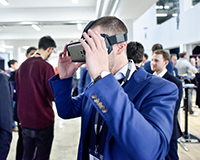 Imagine a future in which the nightmare of standing packed like cattle on an overcrowded train, or having to haggle with security to re-enter your office after forgetting your pass, is virtually unknown.
Imagine a future in which the nightmare of standing packed like cattle on an overcrowded train, or having to haggle with security to re-enter your office after forgetting your pass, is virtually unknown.
Now imagine sitting in your virtual office and seeing your colleagues’ avatars, their facial expressions and body language, as if they were right next to you.
Virtual reality could facilitate this next generation of remote working, and in so doing, profoundly affect urban planning.
Many UK city-centre populations peaked in the early 20th century before shrinking as people migrated into metropolitan suburbs. Since the 1990s, though, city-centre populations have again soared, straining public transport networks and sending residential and commercial real estate prices spiralling.
VR-led remote working could have a substantial impact not only economically, but socially too. Making the remote working experience more immersive and collaborative – whether working from home or from specially-equipped shared offices or public spaces – would reduce the need for travel, reduce emissions, and ease demand for city-centre property. It would also help connect people more closely to their communities, thus supporting the local economy.
This could help to accelerate the decentralisation of the UK economy that has been advocated by experts. At a recent event, the think-tank Nesta suggested that post-Brexit Britain may need to become more “German” by, among other recommendations, reducing economic focus on London.
Government and town planning initiatives that enable greater distribution of the UK workforce will, alongside VR technology, make it easier to work effectively anywhere. The government’s recent announcement of new garden villages points to a desire to support property development outside city centres, but it will be a while before these come to fruition.
The execution of this vision doesn’t depend just on VR technology continuing to evolve. It will also require infrastructure investment – in particular, providing residential and commercial properties with the ultrafast connectivity required to deliver a satisfactory VR experience.
The government has committed to bring high-speed internet to the whole country, and private companies are also driving progress. Cityfibre, for instance, is building “Gigabit Cities” around the UK that provide ultra-high-speed infrastructure. Meanwhile, in the US, Chatanooga, Tennessee, has been able to attract businesses and create jobs by providing city-wide ultrafast connectivity at speeds of up to 10 gigabits.
At present, overall adoption of VR remains low, because of a combination of the high cost of the hardware, the high-grade computer performance requirements, the variable quality of the experience, and reports of “VR sickness”. But new use cases are emerging: VR has been showing particularly transformative potential in education and healthcare. The real estate industry has also been early to identify ways to capitalise on the potential of VR. London-based Vieweet, for instance, has worked with Countrywide to provide VR-led remote viewings of properties, and Vuframe has created tools for visualising new-build commercial and residential properties.
VR is still projected to be an $80bn (£64bn)industry by 2025 as the technology improves and becomes more affordable.
If the economy and workforce continue to evolve as they have done in recent years, VR could by that time have proven integral to an accompanying step change in real estate and urban planning.
Bill Gates said: “We always overestimate the change that will occur in the next two years and underestimate the change that will occur in the next ten.” VR was initially heralded as the solution to all manner of challenges, before disillusionment caused expectations to be revised downwards. But the long-term potential remains immense, assuming government remains committed to ensuring that the right economic policies and infrastructure are in place to support it.
Eyal Malinger is investment director, Beringea











